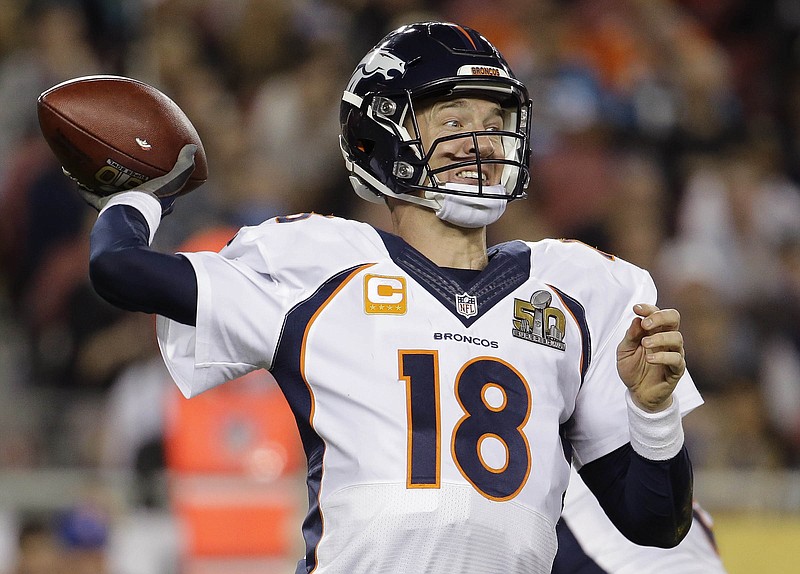Could winning the Super Bowl for a second time be the worst thing that ever happened to Peyton Manning's legacy?
We ask this as details over a 20-year-old sexual misconduct issue involving Manning at the University of Tennessee suddenly seem as fresh as Valentine's Day roses. And to blame all this on New York Daily News columnist Shaun King's seemingly one-sided slam of Manning this past weekend would be naive.
As more than one journalist has pointed out over the past few days since once-Perfect Peyton and his Denver Broncos teammates outlasted the Carolina Panthers to win Super Bowl 50, that 1996 "mooning" incident of Dr. Jamie Naughright and the more troubling details of a second lawsuit brought by Naughright seven years later over the same incident do much to tarnish Manning's aw-shucks-down-home image if those details are proven true.
Without going into great detail, Naughright claimed in the original case that Manning exposed his backside and privates to her in the UT training room where she worked. That incident and other charges from her regarding the school's treatment of her in general led to a $300,000 settlement with UT and an agreement that neither side would speak of the incident again.
However, when the Manning family wrote a book a few years later, at least one chapter painting Naughright in an unflattering light, she sought a second lawsuit and reached a second settlement and nondisclosure agreement.
That agreement came about in 2003 and nothing much more was said about it until King's column, which was almost entirely framed by a 74-page document from the second lawsuit that damages the image of both Peyton and his father, Archie. Think Lance Armstrong Lite on the end-justifies-the-means philosophy of smearing anyone who doesn't support you and you have a general idea of the Mannings' apparent game plan for dealing with Naughright.
Yet that 74-page document was created by the plaintiff (Naughright) and her attorneys. It was her supposed evidence against the Mannings. Nothing more, nothing less.
Nevertheless, for those inclined to seek cracks in Perfect Peyton's facade, King's column provided all they'd ever need.
And that hatchet job didn't even touch on Manning's recent HGH rumors, brought about by Al Jezeera America, which claims he used the banned substance to help recover from neck surgery. Manning certainly has gone to great lengths to deny the HGH use, and his silence on the Naughright situation could be seen as simply abiding by the nondisclosure agreement.
But one can't help but wonder how differently all this might have played out if the Panthers had won the Super Bowl.
For instance, a Carolina win would have produced a far happier, media-friendly Panthers quarterback Cam Newton in the postgame interviews, which would have denied the media a chance to pounce on his moody behavior following the loss.
At least some folks believe the eagerness of King and others to go after Manning is due to so many journalists' pummeling of Newton for his perceived childishness in the interview room.
Along those same lines, a few writers certainly have delivered compelling arguments that too many journalists ignored a smiling Newton's embracing of Manning immediately after the game for his less charming performance in the media room.
Given a choice between painting Newton in a positive or negative light, most chose the negative. Throw in the fact that Newton is black and Manning white and the race card was bound to raise its ugly head.
Had the Broncos lost, all that changes. Manning rides quietly into the sunset, a sidebar rather than a centerpiece, his last rodeo a loss, the HGH rumors sure to fade.
Instead, a Broncos win has him, perhaps for the first time in his nearly 40 years of life, the unwelcome center of attention and criticism. To the victor go the boils.
So what becomes of all this? To have spent the entirety of my sports writing career in the Tennessee Valley, hearing at least once a month of something wonderful Manning's done on the condition it's never made public, I tend to give him a pass on a 20-year-old issue as long as newer evidence or new accusations don't begin to paint the picture of a fake rather than a philanthropist.
The HGH mess is also clouded by his injuries. Much like major league pitcher Andy Pettitte's HGH issues as he attempted to recover from injuries, one could hardly blame Manning for trying anything and everything to help him bounce back from four neck surgeries. This isn't to swear on a Bible he never did HGH for other reasons or to swear on that same Bible that he never used HGH for any reason. But just as with Pettitte, professional sports needs to view using such drugs for rehab in a different light than using them for performance enhancement. It's admittedly a thin line, but one that needs to be investigated.
Regardless, as the public's momentary infatuation with the Manning sexual misconduct story has grown, more and more journalists are asking him to speak up on this issue as he so quickly did over the HGH charges.
Not me. I'd tell him to remain silent. Breaking the first nondisclosure agreement from the 1996 settlement is precisely what has Peyton in his current mess.
Who knew 10 days ago that a Super Bowl win could lead to at least a temporary lessening of respect and admiration for the most beloved Vol ever?
Contact Mark Wiedmer at mwiedmer@timesfreepress.com.
